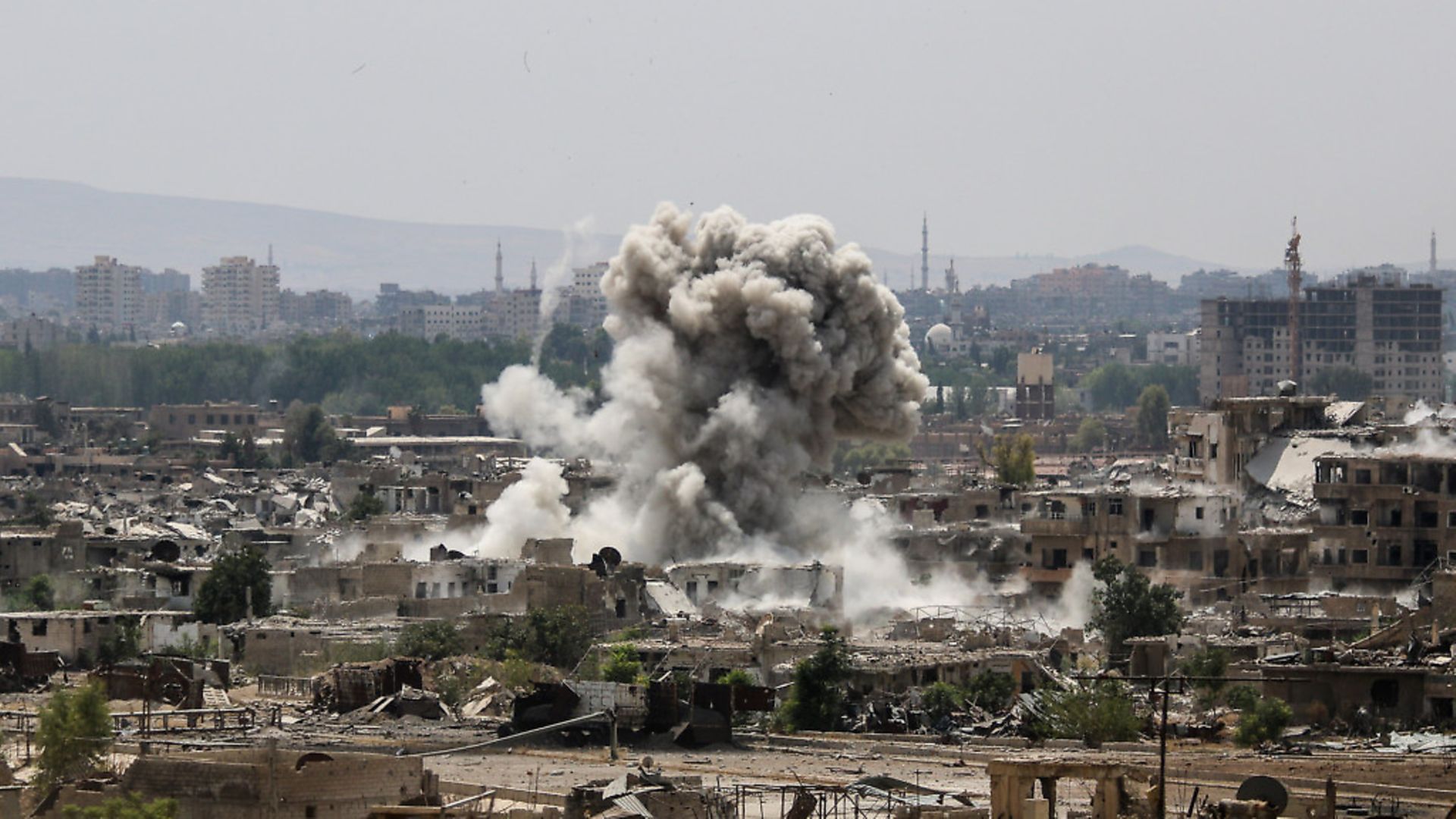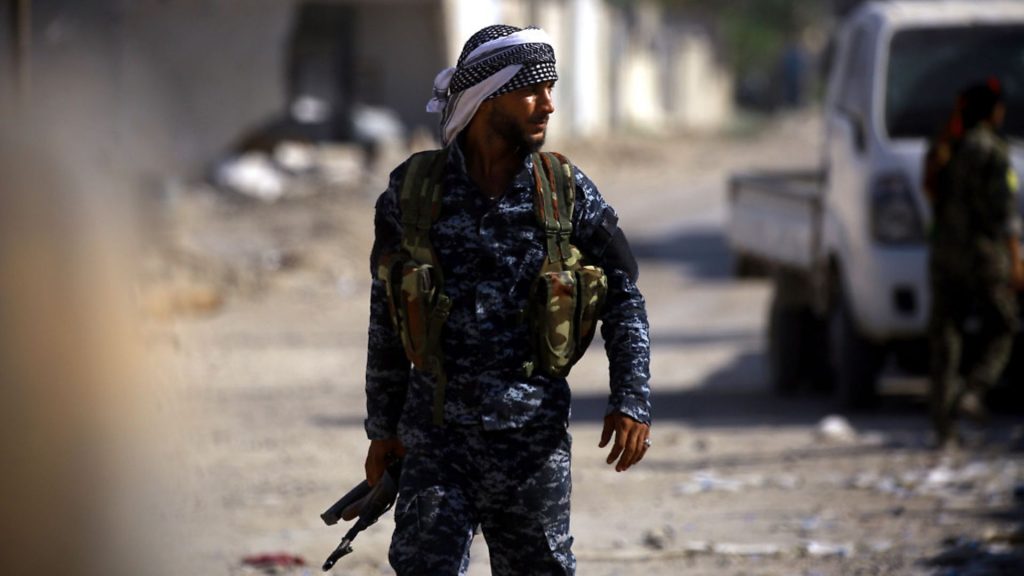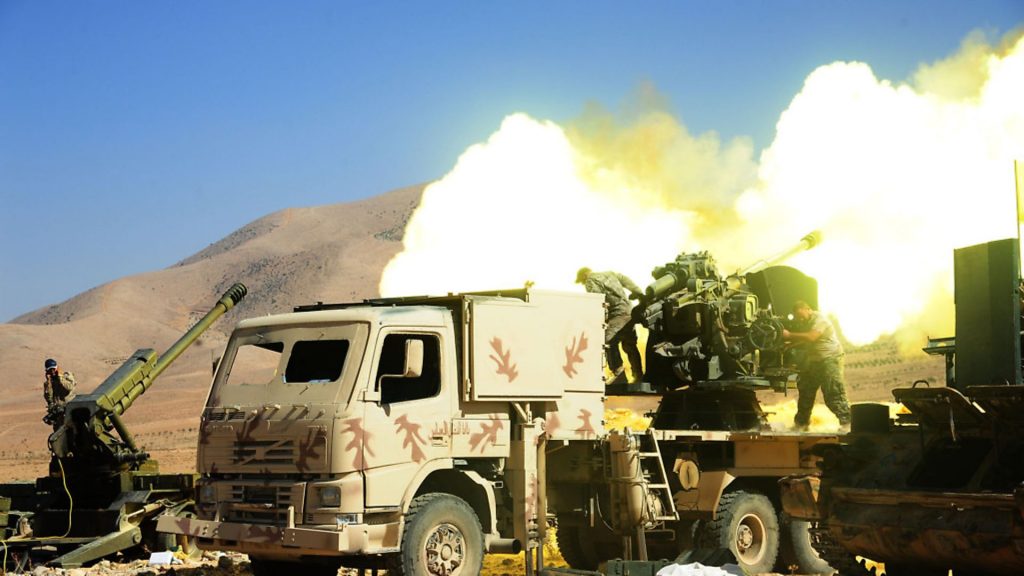
There is a rare chance of peace in Syria. But, Hamish De Bretton-Gordon writes, Brexit is getting in the way of the UK and the EU playing the role we should.

There was a time when you turned on the news, and all you heard was Iraq. Then came Syria. Now there is Brexit.
Day after day, argument after argument, split after split, Brexit, Brexit, Brexit. It is as though we can only cope with one big issue at a time.
As someone who has worked most of my life in the military, and since then as a chemical weapons expert and campaigner, I admit that Iraq and Syria – today especially the latter – are of greater interest to me than whether UK ministers and European Union negotiators can agree on Brexit.
Yet, especially on my most recent trips to Syria, I am beginning to see more clearly that the Brexit distraction is getting in the way of other huge challenges, and as a consequence reducing our authority, our relevance, and our ability to carry out our obligations to the rest of the world. Both the UK and European Governments are abrogating their responsibilities to help sort the Syrian crisis.

As Barcelona becomes the latest European city to fall victim to ISIS-inspired terrorism, we are reminded again of the interconnected nature of our world and its manifold challenges. But as we survey the international picture as it relates to Syria, we are painfully absent considering that we remain one of the great military powers, and a major diplomatic force with our permanent seat on the UN Security Council, along with the US, Russia, China and France.
It is the Russians who are putting military police on the ground to monitor the ceasefire, which they, the US and Jordan agreed for Southern Syria at the G20 a few weeks ago. This has now also been extended to East Ghouta, scene of one of the Assad regime’s most horrific chemical weapons attacks in 2013, which took the lives of up to 1,500 people, mostly women and children. On the face of it, this ceasefire should, in effect, turn the ‘symbolic but nebulous’ de-escalation zone in these areas into a Safe Zone. Yet, the major rebel town in the area, Daara, has been pounded and besieged by Assad forces. Aid hasn’t reached Daara for more than six months and there are horrific stories of deprivation and starvation, just a few miles from Jordan’s border.
It seems clear that President Vladimir Putin is now tiring of the Syrian war and has achieved his strategic objectives of greater relevance, the sewing of confusion, and more specifically the establishment of an air and naval base on the Mediterranean. He would now like to reduce his military presence in Syria and improve relations with the US.
President Donald Trump showed his positive intent in Syria, when he ordered the destruction of Syrian jets which dropped the deadly nerve agent Sarin on Kan Sheikoun killing up to 100 civilians in April. But fair to say his interest in this, as in so much else, waxes and wanes.
The energetic President Emmanuel Macron of France has indicated he is keen to support peace with his Mediterranean counterpart and will even acquiesce to a Syria in future run by Assad if that would secure peace. I understand other Western Governments including the UK may soon share this view. This would be the game changer. In conversation with some of the most influential Syrian Diaspora, many of them now accept that Assad might have to play a role in future; this view is possibly even more significant.
The other key players in this most complex of situations are Turkey, Iran and Israel. Turkey would like to secure its southern border, and is vexed by the Syrian Kurds and their US-backed military arm, the YPG [People’s Protection Units] doing most of the heavy lifting and being successful against ISIS in Raqqa. Quizzically, Turkey has excellent relations with the Iraqi Kurds in Northern Iraq who may opt for an independent Kurdistan later this year, but view the PKK, in effect Turkish Kurds, as terrorists, as does most of the globe.
Israel’s Prime Minister Benjamin Netanyahu initially supported the ceasefire but then retracted, as it was suggested that the forces to police it in Southern Syria, between the Golan Heights and Israel, would come from Iran, their greatest enemy. That idea was a non-starter, given Israel and Iran must be separated in time and space to prevent them coming to physical and ideological blows, and further destabilising the region, if that were possible.
Syria itself is devastated, starving and in the main razed to the ground. The fresh and vibrant hopes of the Arab spring are washed away in blood down the Euphrates over the last six years, which have seen more than 400,000 deaths, around four million refugees and 11 million displaced in Syria. The terror of ISIS expanded and then contracted to Raqqa.
Without hope, and at least the prospect of some sort of fair, effective governance in Syria, as another ISIS soldier is killed so another will rise from this chastened population. If we don’t physically and ideologically defeat ISIS in Syria and Iraq it will be much more difficult to defeat them on the streets of London, Paris, New York, Moscow, Beijing – and Barcelona.
For the UN Geneva Process, tasked with finding the political solution, to have any chance of success, there needs to be a ‘proper’ ceasefire and copious amounts of humanitarian aid delivered. It would appear that all those with a dog in this fight – Russia, the US, Turkey and Iran – have agreed the ceasefire, but it simply is not working comprehensively. To give just one example, Turkey, Russia and Iran set up four de-escalation zones in May 17 in Idlib Province, Homs, Ghouta and in the south around Daara. These appear to be escalation zones rather than the converse, with Idlib, Ghouta and Daara especially hard hit, and with chemical weapons allegedly in almost daily use in Ghouta and Idlib recently. Idlib is currently over run by the Jihadists and Al Qaida and there is a strong argument for international action rather than indiscriminate Russian and Syrian air strikes to secure this province with its two million desperate civilians, mostly refugees.
This is where the UN must come in. The UN, not the Russians, should be playing the UN role. With powers as varied as Russia, America, Turkey and Iran united in wanting the ceasefire, it must be possible for the five permanent members of the UN Security Council to agree to get UN monitors on the ground to verify it. The second enabling function which only the UN can adequately oversee is to get aid to all who need it quickly, which is most of the people in Syria. There are huge amounts of aid available in Turkey, Lebanon and Jordan. But if it does not get to those who need it, then we will see a repeat of Iraq 2003, where the battle was won but the peace was lost by not feeding and administering the vanquished and destitute, and the conditions in which terrorists could flourish were allowed to grow.
Of course there are risks to any UN peacekeepers. There remain pockets of IS and Al Qaida that need to be avoided. The regime’s attack on a UN convoy in Aleppo last year is still fresh in the mind. But the political situation has changed, not least Russia’s posture, and the UN is the only viable and fair delivery merchant. China is not much touched by Syria and ISIS, at the moment, but would benefit from support of the Permanent Five to deal with North Korea, and better commercial relationships with the US in particular. So we may have a rare opportunity to get the P5 aligned, to make the hitherto improbability of peace and prosperity in Syria an option.
Britain can and must play a leadership role in making this happen, by motivating and mobilising the UN to act. Foreign Secretary Boris Johnson has talked about UK troops being on offer for a UN force to monitor the peace and deliver aid in Syria. He and the Prime Minister must move from talk to action.
It is time we lifted our head out of the Brexit mire to show we are still capable of doing something that historically we have been really good at, diplomacy and muscular humanitarianism – that is getting aid to the most difficult places.
As a P5 member we can and we must mobilise the UN to monitor the ceasefire and enable this aid. Only then will there be the remotest chance of the Geneva process working to deliver a long-term solution to this most horrific crisis, which at times has moved us so much, and from which we now, lost in Brexit, appear to be averting our gaze.
In the very short term, with RAF transport aircraft a short flight away in Cyprus, the ceasefire provides the opportunity to air drop hundreds of tonnes of aid into Daara and the environs in Southern Syria now, to alleviate the most acute suffering, and give a chance for ground based aid to ramp up. The time to do it is now. But I worry that with Brexit consuming the bandwidth in Downing Street, the Foreign Office and everywhere else in government, the need will be obvious but the political will and energy sadly lacking.
Time is running out for Syria, and that matters to us. Because failure to tackle these problems there, now, will impact on our streets, in the future. The UN must be front and central to the solution. There must be direct political, diplomatic and financial support from the P5 and other wealthy donor countries. Israel and Iran must be kept apart. Due deference must be given to the Turkish and Kurd issues. Above all there must be full support for the Geneva Peace Process.
I gauge from my many discussions with people inside and outside Syria that if the UN leads as described, the people, war-weary and starving, are ready for peace, and are prepared to negotiate some of the really tricky issues which have thus far been intractable.
To prevaricate anymore, at this stage, will be to replay the post-conflict mistakes of Iraq 2003, in spades, and condemn the vast majority in Syria to terminal decline, stoke the embers of IS, and so prolong this shadow of terror to the UK and elsewhere ad infinitum?
Let us not use Brexit as the reason to excuse ourselves from our global responsibilities to enable peace, humanitarian aid and reconstruction where it is needed, and most especially in Syria and Iraq right now. Global Britain does not need Brexit to have meaning. This region, and the security of the world needs a Global Britain right now, Brexit or not.
Hamish de Bretton Gordon, a chemical weapons expert specialising in the Middle East who advises NGOs in Syria, was a UK Army officer for 23 years.









